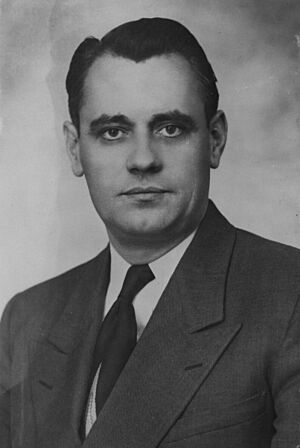Michael Starr (politician) facts for kids
Quick facts for kids
Michael Starr
|
|
|---|---|

Starr, c. 1940s
|
|
| Leader of the Opposition | |
| In office September 9, 1967 – November 5, 1967 |
|
| Preceded by | John Diefenbaker |
| Succeeded by | Robert Stanfield |
| Member of Parliament for Ontario |
|
| In office May 26, 1952 – June 25, 1968 |
|
| Preceded by | Walter Thomson |
| Succeeded by | Norman Cafik |
| Personal details | |
| Born |
Michael Starchewsky
November 14, 1910 Copper Cliff, Ontario, Canada |
| Died | March 16, 2000 (aged 89) Oshawa, Ontario, Canada |
| Political party | Progressive Conservative |
| Spouse | Anne Zaritsky |
| Profession | Judge |
Michael Starr, born Michael Starchewsky on November 14, 1910, was an important Canadian politician. He passed away on March 16, 2000. He made history as the first Canadian government minister who was of Ukrainian descent. His parents came to Canada from a region called Halychyna, which is now part of Western Ukraine.
Contents
Michael Starr's Early Life and Political Start
Michael Starr was born in Copper Cliff, Ontario. He began his political career in the city of Oshawa. From 1944 to 1949, he served as an alderman on the Oshawa City Council. An alderman is like a city council member.
After that, he became the mayor of Oshawa. He held this important role from 1949 to 1952. In 1951, he tried to become a member of the provincial government in Ontario, but he was not successful that time.
Serving in the Canadian Parliament
Michael Starr was first elected to the House of Commons in 1952. This is where Canada's main laws are made. He was a member of the Progressive Conservative Party. He was re-elected six times, showing that people trusted him.
From 1957 to 1963, Starr served as the Minister of Labour. This meant he was in charge of government policies about jobs and workers' rights. He worked in the government led by John Diefenbaker. Later, from 1965 to 1968, he was the House Leader for the Opposition. This role involves helping to guide the party that is not in power.
In 1967, Michael Starr tried to become the leader of his party. However, he was not chosen for the top leadership role.
Leader of the Opposition
When Robert Stanfield became the new leader of the Progressive Conservative Party in 1967, Michael Starr took on a special role. For two months, he was the Leader of the Opposition. This is a very important job, as the Leader of the Opposition leads the main party that is not in power. He held this role until Robert Stanfield won a seat in the House of Commons.
In the 1968 election, Starr lost his seat by a very small number of votes. He tried to win it back in 1972 but was not successful.
Later Career and Achievements
After leaving Parliament, Michael Starr continued to serve the public. From 1968 to 1972, he worked as a citizenship court judge in Toronto. This meant he helped people become Canadian citizens.
In 1973, he was appointed chairman of the Workers' Compensation Board of Ontario. He held this position until 1980. This board helps workers who have been injured on the job.
Michael Starr was also honored for his service. He received several medals, including the Queen Elizabeth II Coronation Medal and the Canadian Centennial Medal. These awards recognized his contributions to Canada.
In 1983, a government building in Oshawa was named in his honor. The Michael J. Starr building is a large office building. This shows how much he was respected in his community.
Starr is remembered for helping different ethnic groups and minorities in Canada. He worked to improve policies like old age pensions. He also helped to make the national employment service more helpful for people looking for jobs. During his time as Minister of Labour, he expanded unemployment benefits to include women and seasonal workers. He also helped provide more federal money to provinces for job training programs.
Michael Starr passed away in Oshawa on March 16, 2000, at the age of 89. He was a dedicated public servant who made many positive changes for Canadians.
 | Ernest Everett Just |
 | Mary Jackson |
 | Emmett Chappelle |
 | Marie Maynard Daly |

